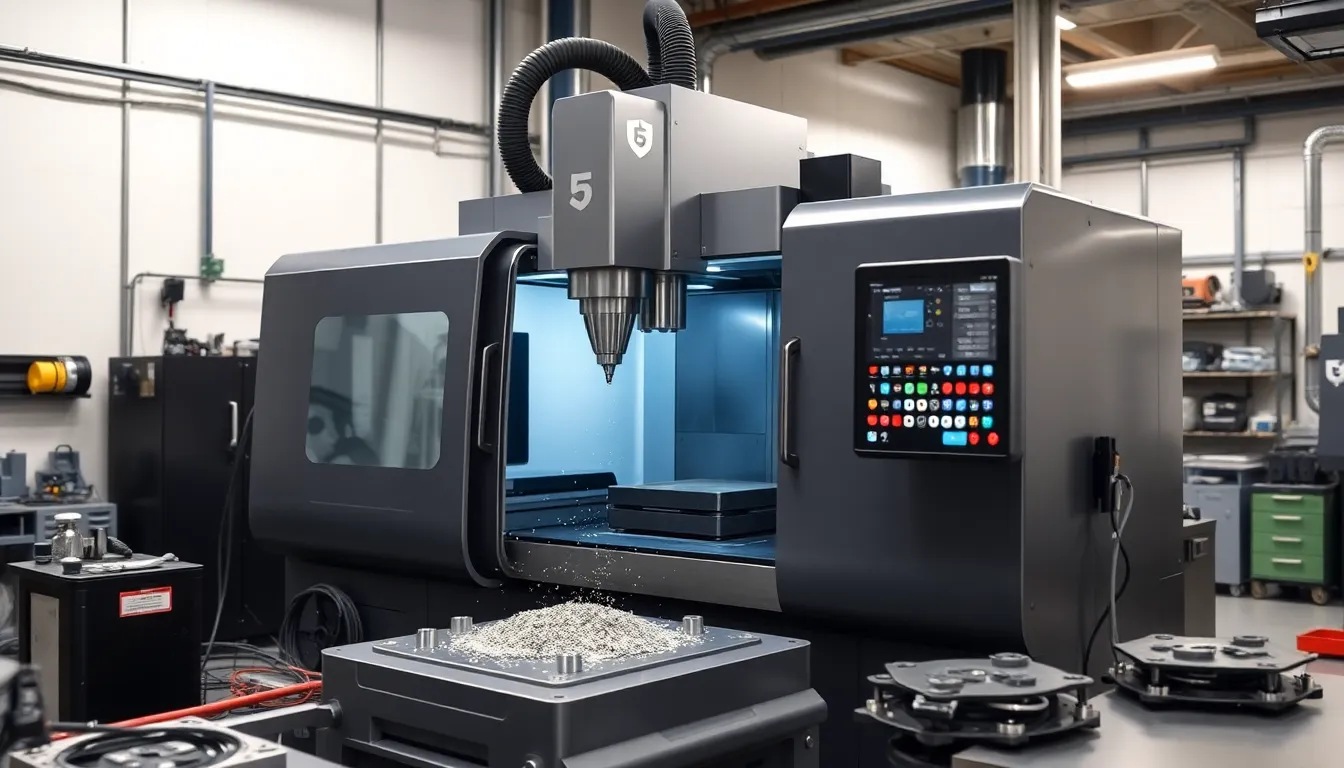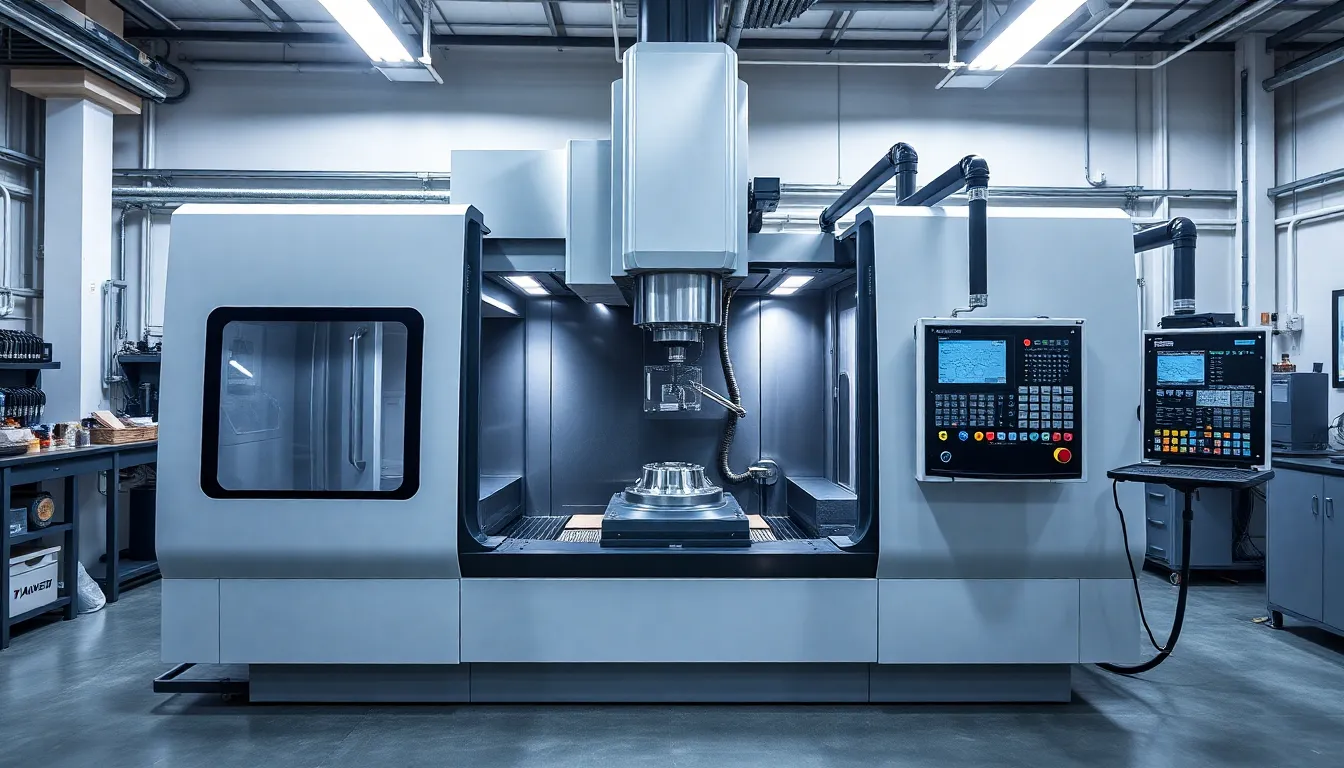
Key Takeaways
- CNC machine costs vary widely based on machine type, size, features, and brand, with prices ranging from under $1,000 for hobby models to over $1,000,000 for industrial 5-axis systems.
- Additional factors such as automation, multi-axis capabilities, advanced software, and accessories significantly influence the total investment.
- Hidden and ongoing costs—including installation, maintenance, repairs, training, and software updates—are crucial to account for when budgeting for a CNC machine.
- Choosing the right CNC machine requires carefully matching machine capabilities to specific production needs, tolerances, and budgets.
- Brand reputation and after-sales support play key roles in long-term reliability, efficiency, and overall return on investment.
CNC machine costs vary widely based on machine type, size, features, and brand, with prices ranging from under $1,000 for hobby models to over $1,000,000 for industrial 5-axis systems in 2024. Entry-level machines cost $150-$30,000, mid-range models range $30,000-$250,000, and industrial machines start at $100,000 with advanced capabilities. Additional factors including automation, multi-axis capabilities, advanced software, and accessories significantly influence total investment, whilst hidden and ongoing costs such as installation, maintenance, training, and software updates are crucial to account for when budgeting. For comprehensive precision manufacturing services and expert CNC machine consultation, Yijin Hardware provides CNC machining, sheet metal fabrication, die casting, injection molding, and 3D printing solutions across automotive, aerospace, medical, and energy sectors, delivering tailored solutions with expertise in matching machine capabilities to specific production needs, tolerances, and budgets for optimal return on investment.
Understanding CNC Machines
CNC machines, or Computer Numerical Control machines, automate precise cutting, drilling, and shaping processes using programmed instructions. Manufacturers use CNC machining for consistent production of parts in sectors like automotive, aerospace, and medical. Each CNC machine type—such as milling machines, lathes, routers, or grinders—features unique capabilities. Three-axis milling machines handle basic shapes, while five-axis models manage complex geometries for advanced industries.
CNC technology offers repeatability, speed, and accuracy when compared to manual machining. Typical features include digital controls, automated tool changing, and integrated quality sensors. Machine size and power range from small benchtop units for light prototyping to large industrial models for heavy-duty production.
Yijin Hardware in Homestead, FL, supplies CNC machining services tailored to customer requirements. Their equipment supports prototyping and large-batch production, serving automotive, aerospace, and medical clients. Gavin Yi, CEO, leads the company in delivering quality results by leveraging CNC machine versatility. Contact Yijin Hardware at +1 626 263 5841 or [email protected] for custom CNC projects. More information about services appears at www.yijinsolution.com.
Factors That Influence CNC Machine Cost

Several key factors determine CNC machine cost in 2025. Buyers in manufacturing and production settings see wide price differences based on machine configuration, size, technical features, and extra accessories.
Machine Type and Size
Machine type and size directly affect CNC machine pricing. Milling machines, lathes, and router machines each offer different price ranges based on complexity and working volume. For example, entry-level CNC routers cost $5,000–$20,000, while high-end CNC mills can exceed $500,000. Larger machines with expansive work envelopes, such as 5’x5’x5′ dimensions, increase costs due to extra materials and design complexity. Smaller desktop models targeted at hobbyists start near $1,000, fitting limited prototyping needs. Manufacturers prioritize workpiece size, machine footprint, and production requirements, as these attributes significantly influence investment.
Brand and Manufacturer
Brand reputation and manufacturer support impact CNC machine cost. Established brands known for reliability, support, and longevity such as Haas or DMG MORI set premium prices. Newer manufacturers or less-known brands may offer lower prices but typically lack national support networks or established reliability records. Buyers in sectors like automotive and aerospace often select machines from established companies because maintenance, spare parts availability, and technical support directly influence total production costs. Industry leaders justify higher prices by offering consistent accuracy, robust construction, and advanced after-sales service.
Features and Capabilities
Advanced features and capabilities improve CNC machine prices. Machines with multi-axis capabilities (such as 4-axis or 5-axis operation), higher accuracy (tight tolerances such as +/- 0.0003″), or automation features like automatic tool changers command premium prices. Additional software integration, real-time monitoring, and adaptive controls improve precision and productivity, increasing cost. Custom configurations for specialized materials or complex geometries, often requested by medical or aerospace manufacturers, result in higher upfront expenses but offer significant long-term productivity gains.
Additional Accessories and Software
Accessories and software packages further influence total machine cost. Essential add-ons include probing systems, chip conveyors, and automation components such as robotic loaders. Advanced software solutions for CAD/CAM, real-time diagnostics, and process simulation increase investment. For instance, a standard CNC machine with basic features differs drastically in price from a model bundled with high-level automation, integrated safety features, or specialized measurement equipment. Businesses seeking tailored performance typically allocate extra budget to include these tools, aiming for enhanced output and streamlined production workflows.
Price Ranges for Different CNC Machines
CNC machine costs in 2024–2025 depend on tier, size, and performance capabilities. Price segments help buyers compare investment levels for entry-level, mid-range, and industrial CNC equipment.
Entry-Level CNC Machines
Entry-level CNC machines fit hobby applications and small-scale workshops. Desktop CNC routers start at $150, and hobby routers reach $1,000 to $3,000. Entry-level metal CNC mills and lathes range from $10,000 to $30,000. Machines in this segment typically feature lower power, fewer automated tools, and minimal multi-axis capability. Suitable for prototypes, single parts, and limited production runs, many workshops use these systems for wood, plastics, and soft metals. Brands like Sainsmart and Carbide 3D target hobbyists, while Tormach focuses on small businesses seeking affordable metalworking capabilities.
Mid-Range CNC Machines
Mid-range CNC machines suit production-focused businesses requiring greater precision and automation. Prices range from $30,000 to $250,000 depending on machine size, spindle speed, and control system sophistication. Machines in this tier often include automatic tool changers, advanced cooling, higher accuracy, and multi-axis options. Shops producing batches for automotive, aerospace, and medical sectors often choose this segment. Brands like Haas offer vertical mills, while Mazak and Okuma provide mid-tier lathes with enhanced performance for batch manufacturing and high-mix workflows.
Industrial CNC Machines
Industrial CNC machines provide large-scale solutions for high-volume manufacturing and critical tolerances. Pricing starts at $100,000 and can exceed $1,000,000 for 5-axis machining centers or specialized aerospace systems. Equipment in this class supports metals like titanium, Inconel, and hardened steel, boasting spindle speeds, coolant management, robotics integration, and digital automation. Aerospace, automotive, and energy industries standardize on these machines for efficiency and consistent quality. Brands such as DMG MORI, Makino, and Hermle manufacture models capable of seven-axis motion, pallet changers, and lights-out production environments.
Hidden and Ongoing Costs
Hidden and ongoing costs for CNC machines extend beyond the initial purchase price. Companies manage recurring expenses related to installation, upkeep, staff competency, and supporting systems to ensure efficient production.
Installation and Setup
Installation and setup create essential upfront investments in a CNC machine’s lifecycle. Technicians level, align, and anchor machines, helping maintain critical tolerances. Securing workpieces and configuring tool paths with compatible software like Fusion 360 or Mastercam further add to costs. Entry-level installations often take hours, while large industrial models may require several days and third-party assistance. Expenses include shipping, rigging, calibration, and certification, which may add $1,000–$10,000 to the initial purchase depending on machine size, shop location, and service provider.
Maintenance and Repairs
Maintenance and repairs sustain CNC machine performance and prolong asset life. Lubrication, coolant system cleaning, and spindle rebuilds are routine for machines in daily use. Typical annual costs for maintenance range between $500 and $5,000, depending on operational intensity and machine class. Unplanned repairs such as replacing ball screws or drive motors can incur significant charges, disrupting workflow and increasing downtime. High-production environments prefer scheduled preventive maintenance to control costs and minimize unexpected failures.
Training and Support
Training and support invest in operator proficiency and programming skill sets. Companies regularly pay $20–$50 per hour for in-person or remote training sessions covering G-code programming, CAM software, and machine controls. Updated machines require ongoing support to address software revisions and troubleshoot operational issues, which may involve maintenance contracts or service subscriptions. Well-trained staff reduce error rates and scrap, contributing to smoother CNC operations and lower overall production costs.
Tips for Choosing the Right CNC Machine for Your Budget
- Define part requirements: Identify the size, shape, and material of parts needed for your application. Select a CNC machine with the right work envelope and material compatibility, constraining choices to functional necessities.
- Compare precision levels: Determine the required tolerance for finished parts. High-precision CNC machines, such as those for aerospace or medical industries, command higher prices due to accuracy and repeatability.
- Assess machine complexity: Match machine axis count and automation features to project complexity. For example, simpler parts use entry-level 3-axis mills, while intricate geometries require more expensive 5-axis machines.
- Evaluate operating costs: Calculate hourly expenses, including labor, energy, and maintenance. Average 3-axis CNC machining costs $50–$100 per hour, while 5-axis machines reach $150 per hour or more.
- Prioritize necessary features: Select only essential features, excluding unnecessary add-ons that improve initial and ongoing costs. Focus on automation, spindle power, and software as required for your workload.
- Choose machine class by business type: Startups and small shops benefit from entry-level CNC routers or mills priced from $5,000 to $30,000. Large manufacturers handling high volumes gain from investing in advanced equipment exceeding $100,000 for productivity and capacity.
- Factor in brand reputation and support: Established suppliers offer reliability, technical support, and service agreements. Yijin Hardware in Homestead, FL, led by CEO Gavin Yi, provides CNC machining consultation and support for precision projects in sectors such as automotive, aerospace, and medical.
- Plan for ongoing investment: Include maintenance, operator training, and software upgrades when budgeting. These factors significantly affect long-term ROI beyond the initial machine purchase.
Contact Yijin Hardware at +1 626 263 5841 or [email protected] for consulting and tailored CNC equipment selection. Information about Yijin Hardware’s precision manufacturing services in Homestead, FL is available at www.yijinsolution.com.
About Yijin Hardware
Yijin Hardware, located in Homestead, FL, provides a wide range of precision manufacturing services, including CNC machining, sheet metal fabrication, and custom fasteners.
Led by CEO Gavin Yi, Yijin Hardware also offers additional solutions such as die casting, injection molding, and 3D printing, supporting industries such as automotive, aerospace, medical, and energy. With a commitment to high-quality, precision-engineered products, Yijin Hardware delivers tailored solutions to meet the unique needs of its clients across various sectors.
Contact:
Gavin Yi, CEO
Phone: +1 626 263 5841
Email: [email protected]
Website: www.yijinsolution.com
Location:
760 NW 10th Ave, Homestead, FL 33030
Frequently Asked Questions
What is a CNC machine?
A CNC (Computer Numerical Control) machine is a programmable device used in manufacturing to automate precise cutting, drilling, and shaping processes. It follows digital instructions to create consistent and accurate parts from various materials.
How much does a CNC machine cost in 2025?
CNC machine prices in 2025 range widely. Entry-level machines start at $150–$30,000, mid-range models range from $30,000–$250,000, and industrial machines can exceed $1,000,000, depending on size, features, and brand.
What factors influence the cost of a CNC machine?
Key factors include the machine’s type and size, brand reputation, automation level, included technology, extra accessories, and software. Machines with advanced features and reputable brands generally cost more.
Are there hidden or ongoing costs with CNC machines?
Yes, expenses like installation ($1,000–$10,000), annual maintenance ($500–$5,000), repairs, and operator training ($20–$50 per hour) should be considered along with the initial purchase price.
What industries benefit most from CNC machines?
Industries such as automotive, aerospace, medical device manufacturing, and metalworking benefit most due to the demand for high precision, speed, and consistent quality.
How do I choose the right CNC machine for my business?
Define what parts you need to produce, compare machine precision and complexity, assess operating costs, prioritize essential features, and consider brand reputation and after-sales support.
Can CNC machines be upgraded with accessories and software?
Yes. Most CNC machines can be customized with additional accessories and software packages for tailored performance, though this will increase the total investment.
Is training required to operate a CNC machine?
Proper training is highly recommended to ensure safe and efficient machine operation. Well-trained operators minimize errors and optimize productivity.
Where can I get custom CNC machining services?
Yijin Hardware in Homestead, FL, offers custom CNC machining for prototypes and large-batch production. Contact them at +1 626 263 5841, [email protected], or visit www.yijinsolution.com.

